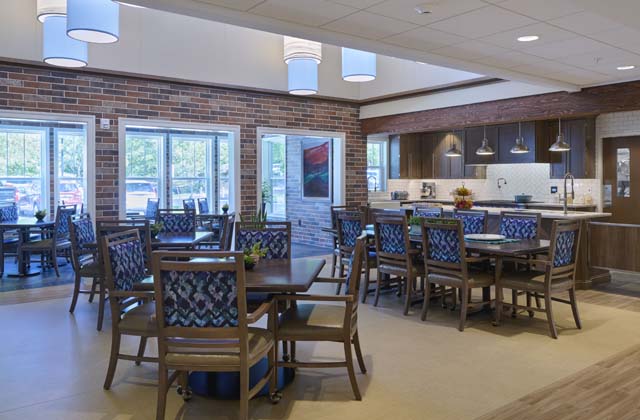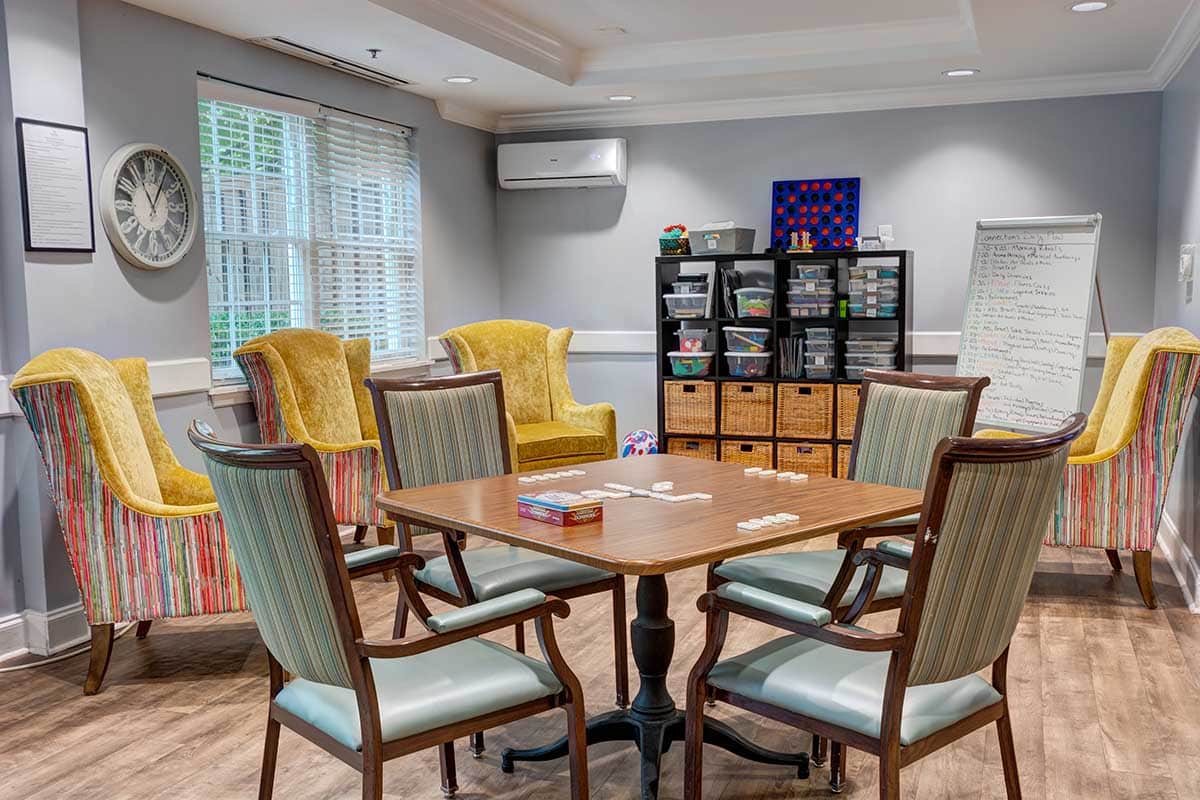All About Memory Treatment Solutions: Why Tiny Memory Treatment Homes Are a Great Choice
Memory care solutions play an important duty in sustaining individuals with Alzheimer's and mental deterioration. Tiny memory treatment homes stick out for their personalized strategy and intimate setup. With lower staff-to-resident ratios, these homes cultivate more powerful connections and tailored care. Residents benefit from boosted social interactions and a safe environment. As families check out alternatives, comprehending the unique benefits of small memory treatment homes becomes vital. What elements should be thought about when selecting the appropriate home?
Understanding Memory Treatment Solutions
While lots of may know with basic elderly treatment options, comprehending memory treatment services is necessary for families dealing with the difficulties of cognitive decrease. Memory care especially satisfies individuals with conditions such as Alzheimer's condition and various other types of dementia. These solutions provide a structured setting that concentrates on enhancing the high quality of life for locals with specialized treatment and support.Memory care facilities are developed to ensure security and security, typically featuring secured settings to avoid roaming. Trained team members are readily available around the clock to aid with everyday tasks, medication monitoring, and personal care. In addition, memory care programs frequently consist of cognitive excitement activities, tailored to engage citizens and promote mental wellness. Households can gain from recognizing these services, as they make it possible for notified decisions concerning their enjoyed ones' care, making certain that their details needs and choices are attended to in a thoughtful and supportive fashion.
The Advantages of Little Memory Care Homes
Tiny memory treatment homes supply unique advantages that can greatly enhance the quality of life for residents with cognitive problems. One significant benefit is the intimate environment, which enables for individualized interactions among personnel and homeowners. This smaller sized setting promotes purposeful relationships, lowering feelings of isolation and stress and anxiety usually experienced by individuals with memory issues.Additionally, the lower staff-to-resident ratio in small memory treatment homes allows caregivers to give even more alert guidance and assistance. This method not only improves security however additionally promotes a complacency for the residents.Moreover, little memory treatment homes can adapt rapidly to the special needs and preferences of each homeowner, permitting for an extra homelike atmosphere. Such an atmosphere can urge social interaction and involvement in tasks, ultimately enriching the daily experiences of those coping with cognitive problems.
Personalized Care Program for Locals
Individualized care strategies are essential in memory care homes, as they accommodate the one-of-a-kind demands and preferences of each homeowner. These strategies begin with comprehensive assessments carried out by knowledgeable professionals, who review cognitive capabilities, clinical background, and personal rate of interests. This customized technique warranties that care is not just efficient yet likewise respectful of each individual's self-respect and autonomy.Moreover, customized treatment plans are flexible, enabling adjustments as citizens' needs evolve with time. This versatility cultivates a complacency and knowledge, which is crucial for people dealing with memory challenges. Caretakers are educated to implement these plans regularly, supplying support that lines up with the locals' routines and preferences.Ultimately, personalized treatment plans boost the lifestyle for locals by advertising involvement, wellness, and self-reliance, making them a fundamental facet of memory care solutions in little memory care homes.
Producing a Home-Like Environment
Creating a home-like atmosphere is crucial for promoting comfort and experience in memory treatment settings, as it significantly influences locals' psychological wellness. Small memory care homes commonly focus on customized touches, such as warm shade combinations, family members photos, and acquainted furnishings setups, which aid citizens feel more secure. Integrating elements evocative a typical home, like comfortable space and communal areas, motivates a feeling of belonging.Moreover, utilizing natural light and outside rooms can boost the environment, promoting leisure and harmony. Team member play a significant role in keeping this atmosphere by involving with residents in a caring manner, treating them like family members. Regular activities, such as cooking or horticulture, can also add to a home-like feel, providing chances for homeowners to get involved in meaningful experiences. In general, creating a supporting atmosphere supports cognitive feature and emotional stability, making it a vital aspect of memory care services.
Boosted Social Interaction and Area
Enhanced social interaction and community are important components of memory care solutions. By promoting individualized social engagement and creating a family-like environment, these services advertise meaningful connections amongst locals. Group tasks and events further encourage involvement, assisting people really feel more included and supported.
Customized Social Interaction
While social communication is necessary for general well-being, several individuals with memory problems often have a hard time to involve meaningfully with others. Personalized social engagement in memory treatment homes addresses this difficulty by developing tailored tasks that cater to residents' special interests and capabilities. By concentrating on private preferences, caretakers can blog here promote links that resonate deeply with each individual. Tasks such as art therapy, songs sessions, and assisted discussions promote cognitive excitement and emotional expression. Furthermore, small group setups encourage camaraderie and enable even more intimate communications, boosting sensations of belonging. This approach not just combats feelings of seclusion but likewise empowers locals to maintain a feeling of identification, eventually adding to improved psychological health and wellness and lifestyle.
Family-like Atmosphere
In a memory care setting, cultivating a family-like ambience considerably improves social communication and develops a sense of community among residents. Smaller memory care homes usually focus on intimate environments, enabling residents to develop closer connections with one an additional and personnel members. This nurturing atmosphere advertises trust, which is crucial for individuals with memory disabilities. Citizens are a lot more likely to involve in conversations and share experiences, producing an encouraging network that relieves sensations of isolation. The knowledge of shared rooms and routines contributes to a sense of belonging, better urging social communication (personalized memory care). In such settings, psychological bonds flourish, leading to improved general health and a greater top quality of life for locals as they navigate their everyday experiences with each other
Group Activities and Occasions

Security and Protection Functions in Small Residences
Lots of tiny homes designed for memory treatment incorporate essential security and safety attributes to assure the wellness of locals. These homes frequently utilize safe and secure entry and exit factors to stop roaming, a typical worry among people with memory problems. Furthermore, monitoring systems and alarm systems enhance tracking, guaranteeing that personnel can quickly reply to any type of uncommon activities.Interior designs are tailored for safety and security, with lessened threats such as sharp corners and clutter-free pathways. Handrails and non-slip flooring are generally set up to reduce the threat of falls. Personnel participants are learnt emergency procedures, ensuring they are gotten ready for different situations.Moreover, individualized care plans might include evaluation of specific security requirements, offering customized options for each local. On the whole, these safety and security and safety and security attributes create a nurturing setting where residents can grow while maintaining their self-respect and freedom.
How to Pick the Right Memory Care Home
How can households guarantee they pick one of the most appropriate memory treatment home for their loved ones? The choice needs cautious consideration of several elements. Family members need to evaluate the center's team qualifications and training, guaranteeing that caretakers are experienced in managing memory-related conditions. Next off, it's crucial to evaluate the home's setting, concentrating on security functions and whether it fosters a feeling of community and belonging. Visiting the facility can offer understanding into daily tasks and the social environment, which are essential for psychological stimulation and emotional wellness. Furthermore, households should ask about the treatment plans used, read this post here ensuring they are tailored to individual demands. Taking into consideration the home's area and access for household gos to can contribute to a smoother change. By addressing these elements, households can make an educated decision that prioritizes their loved one's comfort and top quality of life in a memory care setup.
Often Asked Inquiries
What Certifications Should Personnel Members in Memory Care Houses Have?
Employee in memory care homes should have appropriate certifications, experience in mental deterioration care, solid communication skills, and compassion. Recurring training in behavior management and therapeutic treatments improves their ability to support citizens successfully.
Exactly How Do Memory Treatment Provider Differ From Traditional Assisted Living?
Memory treatment services concentrate specifically on people with memory problems, supplying specialized assistance and structured settings. On the other hand, standard assisted living supplies general help with day-to-day activities, lacking the customized strategy essential for those with cognitive difficulties.
What Sorts of Tasks Are Supplied in Memory Care Houses?
Memory treatment homes generally use a selection of activities designed to engage residents. Common options consist of art treatment, music sessions, cognitive games, exercises, horticulture, and read here gatherings, all focused on improving health and cognitive function.
Can Residents Bring Their Own Valuables to Memory Treatment Homes?
Residents can usually bring their own personal belongings to memory care homes, enabling them to individualize their home - personalized memory care. This practice helps produce an acquainted setting, advertising convenience and a sense of identification for the individuals

Exactly How Are Relative Associated With the Care Refine?
Member of the family play a vital role in the treatment process, often taking part in decision-making, going to care conferences, and supplying emotional assistance. Their involvement fosters a collaborative setting, enhancing the local's total well-being and lifestyle. While many may be acquainted with general senior care choices, comprehending memory care services is necessary for families dealing with the obstacles of cognitive decline. These solutions offer an organized atmosphere that concentrates on boosting the quality of life for locals through specialized care and support.Memory treatment centers are designed to ensure safety and security, often including safeguarded settings to protect against wandering. Individualized care strategies are crucial in memory care homes, as they provide to the distinct demands and choices of each citizen. Personnel members in memory treatment homes should possess relevant qualifications, experience in dementia care, solid interaction skills, and compassion. Memory treatment solutions concentrate especially on people with memory impairments, supplying customized support and structured environments.